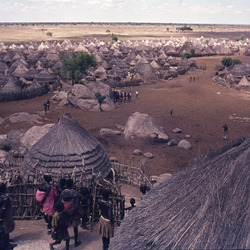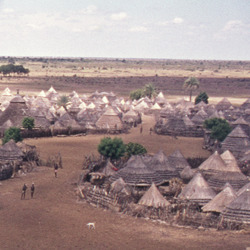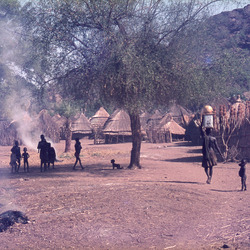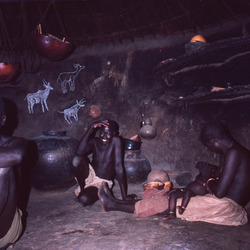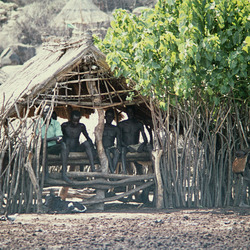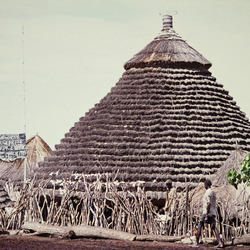Age sets part III 18
When there is sufficient grass for grazing near Lafon Hill, the
livestock are kept in an open space at the back of each village at
night. The houses protect the herd from predators such as hyenas and
lions. The meeting places (‘bali’) for the young age sets, where many of
them sleep at night, are situated near the livestock. These boys herd
the animals for grazing and drinking water, and when the animals leave
in the morning, the space is cleaned.
In front of, and connected
to, the place where the livestock are kept is another open space called
‘tworo’. ‘Tworo’ is situated in the center of each village and is the
heart of the village. When the oldest in an age set is reaches a certain
age (about 24 years old), all the members of the age set are initiated
as warriors, ‘mojomiji’. At this time, the age groups sell their
platforms, ‘bali’, on the hillside and buy a platform at ‘tworo’ from an
older age set (the eldest around 40 years old), who will move to the
‘tworo’ headquarters, ‘kabore’. They become leaders of the warriors,
‘mojomiji’, and will work as the government in each village. The
headquarters is easily spotted as the tallest house in the village. The
men over 50 years old will retire, become ‘chidonge’, and may still
spend much of their time in the headquarters. Their opinion on cases
will be heard, but they will have no power in political and juridical
issues. For issues related to the lineages, the eldest men and women
will make the decisions.
In 1975, the age set named Kilang was in charge, sitting at ‘kabore’ for about 8 years. If peace was maintained and enough food available, the era of Kilang, ‘ukwer of Kilang’, would last for another 10 to 15 years. During the last period, they would be supported at ‘kabore’ by a younger age set assisting them at ‘kabore’.
The ‘mojomiji’ have appointed policemen, ‘longololyer’—two for the two largest villages, one for the other four. The policemen patrol around the hill, and not only in their home village. In case of any trouble, they will help each other. A policeman may address any disagreement that are too loud and disturbing, even if it is between a husband and wife. The policemen listen to the case on the spot and decide on a penalty. The fine is paid in form of grain, which is the payment for the police work. If the troublemakers do not agree to pay the fine, or in cases of more serious crime, the ‘mojomiji’ will hear the case at ‘kabore’ and make the decision the following day. If a ‘longololyer’ is beaten, this is very serious and the fine will be in the form of a bull.
Wiatwo, at the north the hill, has by far the largest population. The head of this village is the head of all Lafon.
Case: One evening it was announced from ‘kabore’ in Kor village that the age groups from Bondi Kweri (not yet mojomiji) up to Ithithi Ucok (mojomijo) should work on the field of the head of the village the coming day. Aliki (my age group) had already decided to work the next day for an old man who had offered us a goat. This job we had to postpone. Later the same day was a new announcement from Kabore: The school was going to start in a week and the villagers had to help building houses for the teachers. This was an order from the Kabore of Wiatwo, the head village of all Pari. The messenger man of Kilang in Kor went to all ‘bali’ of the age groups and told what job was expected from each group. Aliki was told to collect wood for sticks to be used for the house walls. Both jobs should be done the next day. These jobs are work without payment in form of beer or anything else. Those who do not turn up for work, will be fined a measure of grain. Early next morning the horn blower of each age group calls for the members. Aliki met at our bali by Tworo and went together to the field of the village chief. The field was not far from the forest where we collected the sticks in the afternoon. Back home in the village, the horns from the different age groups sounded again, informing that the job had been done.
Case: While we had our beer back in
the village, an old man passed and we invited him in. He took a few sips
and advised: “Enjoy your drink, but when you feel you have had enough,
leave without saying goodbye, otherwise you will be asked to stay for
just a little bit more. If you are drunk, go directly home and sleep and
do not talk to anyone, because then you will easily end up in a quarrel”.
